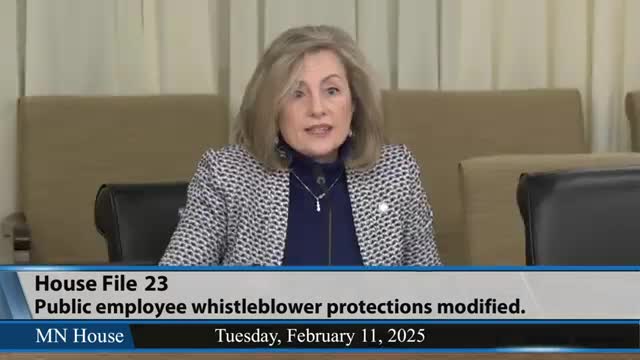Committee advances bill to extend whistleblower protection to reporting of waste, fraud and abuse
Get AI-powered insights, summaries, and transcripts
Subscribe
Summary
House File 23, authored by Rep. Robbins, adds definitions of waste, fraud and abuse to the whistleblower statute and was advanced by the committee after adopting an author's amendment. Supporters urged broader coverage for all public employees; opponents said data-privacy and classification questions remain.
The State Government Finance and Policy Committee on Feb. 11 adopted an author’s amendment and approved House File 23, a bill from Representative Pam Robbins that expands whistleblower protections to explicitly cover reporting of waste, fraud and abuse in state programs. The committee referred the bill to the Workforce, Labor and Economic Development Committee.
Why it matters: Supporters said extending explicit statutory protection will encourage state employees to report suspected misuse of public funds to legislators, the legislative auditor or law enforcement without fear of retaliation. Robbins told the committee the bill “is a bipartisan effort to protect state employees” and aligns statutory definitions with existing statute in the Office of Inspector General’s chapter.
What happened in committee: Robbins moved the A1 author's amendment to align definitions with Minn. Stat. 127A.21 and the amendment was adopted. Testimony included labor and state-employee representatives urging broader coverage. Devin Bruce, director of legislative and political affairs for the Minnesota Association of Professional Employees (MAPE), supported the bill but recommended expanding protections to ‘‘all public employees at all levels of government’’ by amending subdivision 6 of the Whistleblower Act, noting the bill as written would extend new protections only to classified state employees.
Legal and data concerns: Bruce and some members raised questions about the interaction between whistleblower protections and data classification under the Minnesota Government Data Practices Act (chapter 13). Bruce noted that grant applications and contract records can contain nonpublic or proprietary data and that reporting such information carries disclosure risks. He recommended that identity protections for employees who report under the expanded sections be treated as private data.
Action: The committee adopted the author’s amendment (A1) and then approved the bill on a roll-call vote; committee minutes record the final tally as 7 yes, 6 no. The bill will move to Workforce, Labor and Economic Development for further consideration. Members indicated several technical and data‑classification issues remain to be resolved in subsequent committee stops.
Ending: Representative Robbins said she will work with stakeholders in the labor committee to address concerns about data classification and coverage so the statute protects employees who report actual instances of waste, fraud or abuse while respecting existing data-privacy rules.
